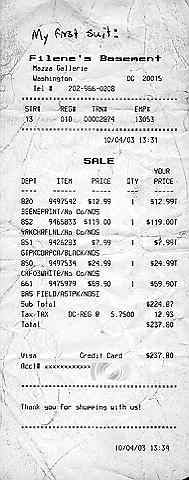
(ADR) Competition in which I was competing. As many predicted, I have needed the suit for at least half a dozen more occasions since then, mostly interviews and competitions (mock trial & moot court). So if I've worn it 8 times (which may be a bit generous), that means each occasion cost me about $30. Considering the occasions for which I need to wear a suit are also generally occasions I don't enjoy (both because I have to wear the suit and for other reasons), that means I've been paying $30/shot to have something much less than fun. Of course, these things are part of the price of admission to law school and a J.D., and they generally lead to better things down the road (i.e., when an interview leads to a job), so I'm obviously just complaining because I can. The suit's fine, and I'm glad I have it on those occasions when it's required.
But why am I posting this receipt now? Well, the 2004 ADR competition was this weekend at GW, and instead of competing, I was a judge. I didn't have to wear the suit, nor did I have to prepare or worry about it like I did last year. I was concerned that I wouldn't have any clue how to judge the competitors, but it turned out there was plenty to say about their different strategies and what they did well or could improve upon. You don't have to be an expert negotiator to have some ideas about how a statement or question might sound in the middle of a potentially important exchange.
I also found that my long hours “judging” undergrads giving presentations (mostly on accounting issues) came in very handy. When you're speaking to relative strangers, there are some things that generally always work, and others which generally always don't work.
Overall, the four teams I saw did really well, and I'm glad I don't have to make any more decision about who “won” the competition overall. Such decisions are necessarily largely arbitrary, which is one of the reasons these law school competitions are so dissatisfying—they're so artificial. Sure, they may be somewhat predictive of how you'll perform in a similar “real” situation, but they also may not be, and some people invest a great deal in them, despite their relatively questionable value. Sure, I'm glad I made the board last year; it looks good on the resume. But to those who didn't make it then or won't make it this year, don't worry about it. There really aren't any clothes on this emperor.

